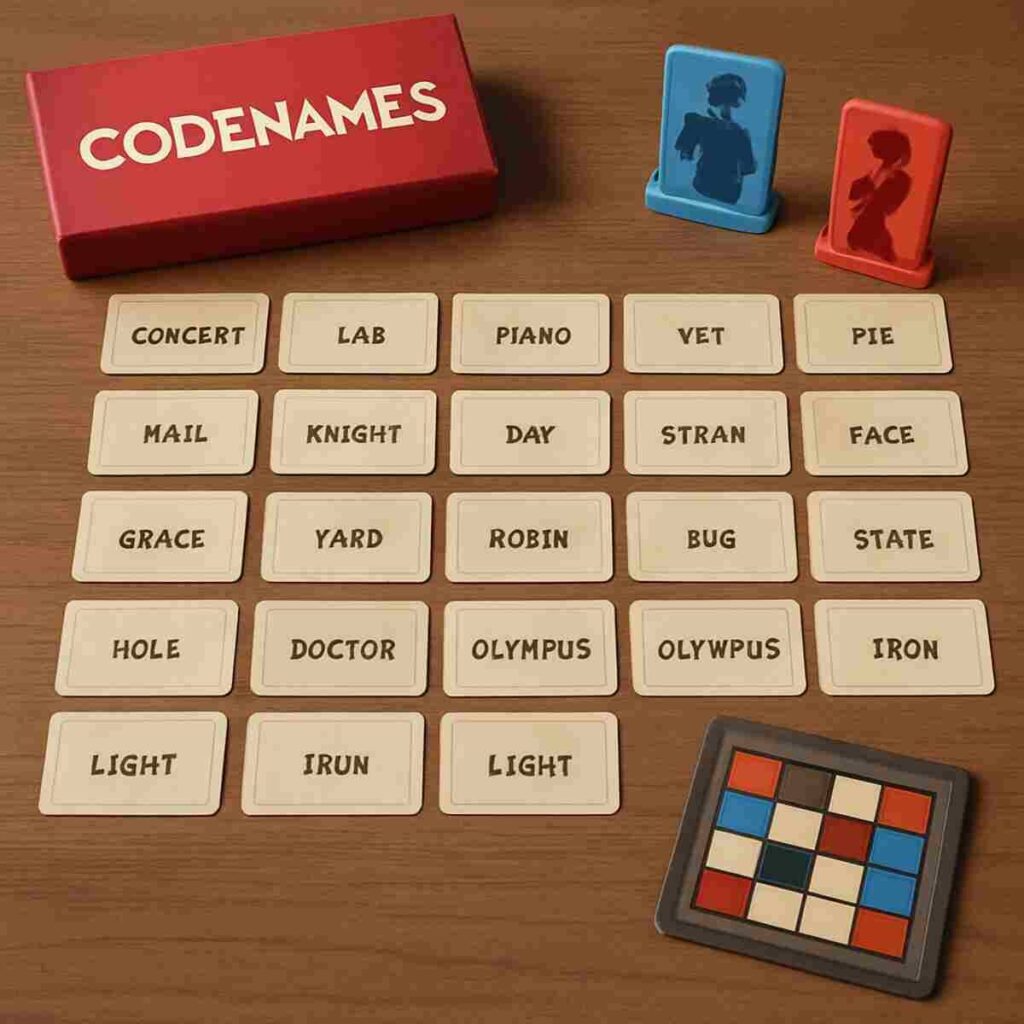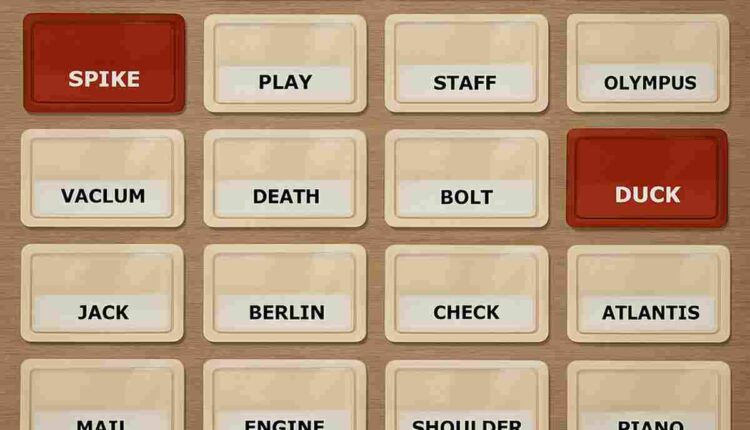Codenames is a brilliant word game that combines strategy, creativity, and teamwork. Whether you’re new to the game or a seasoned player looking to sharpen your skills, understanding the mechanics and strategies of Codenames can significantly enhance your gameplay. In this guide, we’ll delve into winning strategies that you can apply to Codenames online. To learn more, check out ORIN23
Codenames is a team-based game where players take on the roles of spymasters and field operatives. The objective is to identify all the words associated with your team’s color before the opposing team does. Each team has a spymaster who provides one-word clues that relate to multiple words on the board, while the field operatives attempt to guess the correct words based on those clues.
The Role of the Spymaster
The spymaster is critical to the game, responsible for guiding their team with carefully crafted clues. They hold the map of the word grid that reveals which words belong to their team, the opponent, or are neutral. A spymaster must be strategic in crafting clues that maximize the number of words their team can guess while avoiding the assassin word that could end the game in an instant.
The Role of the Field Operative
Field operatives are the boots on the ground, so to speak. They rely on the spymaster’s clues to uncover the correct words. Their role requires intuition, collaboration, and sometimes a bit of risk-taking. Understanding the nuances in the spymaster’s clues and being able to work well with teammates to decipher those clues is vital for success.
Game Objective and Mechanics
The main objective of Codenames is to be the first team to identify all the words associated with your color on the board. The board consists of a 5×5 grid of words, which includes red team words, blue team words, neutral words, and one assassin word. The spymaster gives a one-word clue and a number indicating how many words relate to that clue, and the field operatives must guess the right words based on this information.
Tips for Spymasters
Being a spymaster requires careful thought and creativity. Here are some strategies to help you excel in this role:
Crafting Effective Clues
- Be Vague but Relevant: Your clue should connect multiple words without being too obvious. Use words that have multiple meanings or associations to cover more ground. Balancing vagueness with relevance ensures your team has enough guidance without inadvertently aiding the opponent.
- Consider Word Associations: Think of synonyms, antonyms, or broader categories that relate to the target words. For example, if your words are “apple” and “banana,” the clue “fruit” would work well. This technique helps field operatives make connections quickly, using common knowledge to guide their guesses.
- Avoid Common Words: Steer clear of clues that might accidentally point to words related to the opposing team or the assassin word. It’s essential to be aware of potential overlaps and choose your words carefully to avoid unintentional hints.
- Use Numbers Wisely: The number following your clue indicates how many words relate to it. Be strategic—sometimes a lower number is safer to avoid unintended associations. Remember that overreaching with high numbers can lead to mistakes if the connections are tenuous.
Managing Risk
- Know the Board: Before giving clues, take a moment to study the board. Identify risky words that could be mistaken for your team’s words. A thorough understanding of the board helps you predict possible pitfalls and guide your team around them.
- Watch the Opponent: Pay attention to the words the opposing team is targeting. This might give insights into their strategy and help avoid pitfalls. By understanding their trajectory, you can better navigate your own clues to avoid aiding them inadvertently.
- Communicate Clearly: Be concise and clear with your clues. Avoid using overly complex or ambiguous words that might confuse your teammates. Effective communication can prevent misunderstandings and ensure your team remains on track.
Planning Ahead
- Anticipate Future Moves: Think several rounds ahead, considering how your current clues might set up future guesses. This foresight can help establish a long-term strategy, making it easier to navigate challenging boards.
- Balance Risk and Reward: Weigh the potential benefits of a risky clue against the possibility of leading your team astray. Calculating risk is crucial to maintaining momentum and avoiding costly mistakes.
- Adapt Strategies as Needed: Be prepared to change tactics if the game isn’t progressing as planned. Flexibility is key to overcoming unexpected challenges and seizing new opportunities as they arise.
Tips for Field Operatives
As a field operative, your job is to decode the spymaster’s clues and identify the correct words. Here are some strategies for success:
Decoding Clues
- Discuss Openly: Talk through your thought process with your teammates. Sometimes a fresh perspective can unlock the clue’s meaning. Open dialogue encourages collaboration and ensures that every interpretation is considered.
- Consider Context: Think about the clue in the context of all remaining words. Don’t fixate on the first interpretation that comes to mind. Contextual thinking can uncover hidden connections and prevent tunnel vision.
- Prioritize Likelihood: Rank words based on how closely they relate to the clue given. Start with the most likely candidates. This methodical approach ensures you cover the most probable options first, reducing the chance of errors.
Risk Assessment
- Be Cautious with Guesses: If you’re unsure, it might be wiser to pass rather than risk selecting the assassin word. Exercising caution is often the best strategy when certainty is low.
- Learn from Mistakes: If you guess incorrectly, use that information to better understand your spymaster’s thinking and adjust your strategy. Mistakes are valuable learning opportunities that can improve future performance.
- Trust Your Teammates: Sometimes your teammates might have insights or interpretations that hadn’t occurred to you. It’s a team effort, after all. Trusting in collective wisdom often leads to better outcomes.
Team Dynamics
- Build Team Rapport: Strong communication and trust among team members enhance performance. Encourage a supportive environment where everyone feels comfortable sharing ideas and strategies.
- Manage Time Effectively: Be mindful of the time spent on each clue. Balancing thoroughness with efficiency keeps the game moving and maintains momentum.
- Celebrate Successes: Recognizing and celebrating successful guesses boosts morale and reinforces positive team dynamics. Encouragement and positivity can enhance team cohesion and performance.
Advanced Strategies

Once you’re comfortable with the basics, you can incorporate advanced strategies to further improve your gameplay.
Clustering Words
- Link Multiple Words: Try to give clues that can link more than two words. This can help you cover more ground quickly. However, be careful not to overextend and risk guessing the wrong words. Clustering requires skillful balancing of connections to avoid missteps.
- Identify Natural Clusters: Look for words that naturally group based on shared themes or categories. Recognizing these clusters allows for more efficient clue-giving and guessing.
- Adapt to Board Dynamics: Be flexible with your clustering strategy, adjusting to the evolving game board. As words are guessed and new connections emerge, being adaptable ensures continued success.
Decoy Clues
- Create Misleading Clues: Use decoy clues to mislead the opposing team. This can be particularly effective if you notice they are close to guessing one of their words. Misdirection can create strategic advantages by diverting their focus.
- Balance Misdirection with Clarity: Ensure your team remains clear on your true intentions while misleading opponents. Striking this balance is crucial to maintaining your team’s path to victory.
- Observe Opponent Reactions: Gauge the effectiveness of your decoys by observing opponent reactions. This feedback can inform future strategies and enhance your ability to deceive.
Reading Opponents
- Analyze Opponent Clues: Observe the clues and guesses of the opposing team. This can provide insight into their strategy and help you avoid giving clues that might benefit them. Understanding their thought process can guide your own decisions.
- Predict Opponent Moves: Anticipate your opponent’s next moves based on their previous guesses. By predicting their trajectory, you can better position your team for success.
- Adapt to Their Strategy: Adjust your gameplay to counteract the opponent’s strategy. Flexibility in response to their tactics can neutralize their advantages and shift the game in your favor.
Playing Codenames Online
Playing Codenames online offers a convenient way to enjoy the game with friends or family, regardless of where they are. Here are some tips for playing online:
Choose the Right Platform
- Select Reliable Platforms: Choose a reliable online platform that provides a seamless experience. Some popular options include Codenames.game and Tabletopia. A stable platform ensures smooth gameplay without technical interruptions.
- Explore Features: Familiarize yourself with platform features and functionalities. Understanding these can enhance your online experience and streamline gameplay.
- Check for Updates: Stay informed about platform updates and improvements. Up-to-date software ensures you have access to the latest features and fixes.
Communicate Effectively
- Use Voice or Video Chat: Utilize voice or video chat for effective communication. This can help replicate the in-person experience and make it easier to discuss strategies. Clear communication is key to maintaining team coordination.
- Establish Communication Norms: Set guidelines for communication to ensure everyone is on the same page. Agreed-upon norms facilitate smoother interactions and reduce misunderstandings.
- Leverage Technology: Use technology to enhance collaboration, such as shared screens or digital notepads. These tools can aid in strategy discussions and improve overall gameplay.
Stay Focused
- Minimize Distractions: Playing online can sometimes introduce distractions. Stay focused and engaged with the game to ensure you’re contributing effectively to your team’s success. Eliminating distractions enhances concentration and performance.
- Set Priorities: Prioritize the game during play sessions to maintain momentum and involvement. Dedication to the game ensures a cohesive team effort.
- Encourage Team Engagement: Foster an environment where all team members are actively involved and contributing. Encouragement and inclusivity lead to more dynamic and effective gameplay.
Conclusion
Codenames is a game of wits and strategy that can be incredibly rewarding when played with the right mindset. By honing your skills as both a spymaster and a field operative, you can elevate your gameplay and lead your team to victory. Whether playing in person or online, the key is to communicate effectively, think creatively, and always consider the bigger picture. With these strategies in mind, you’ll be well on your way to mastering Codenames. Enjoy the game!


